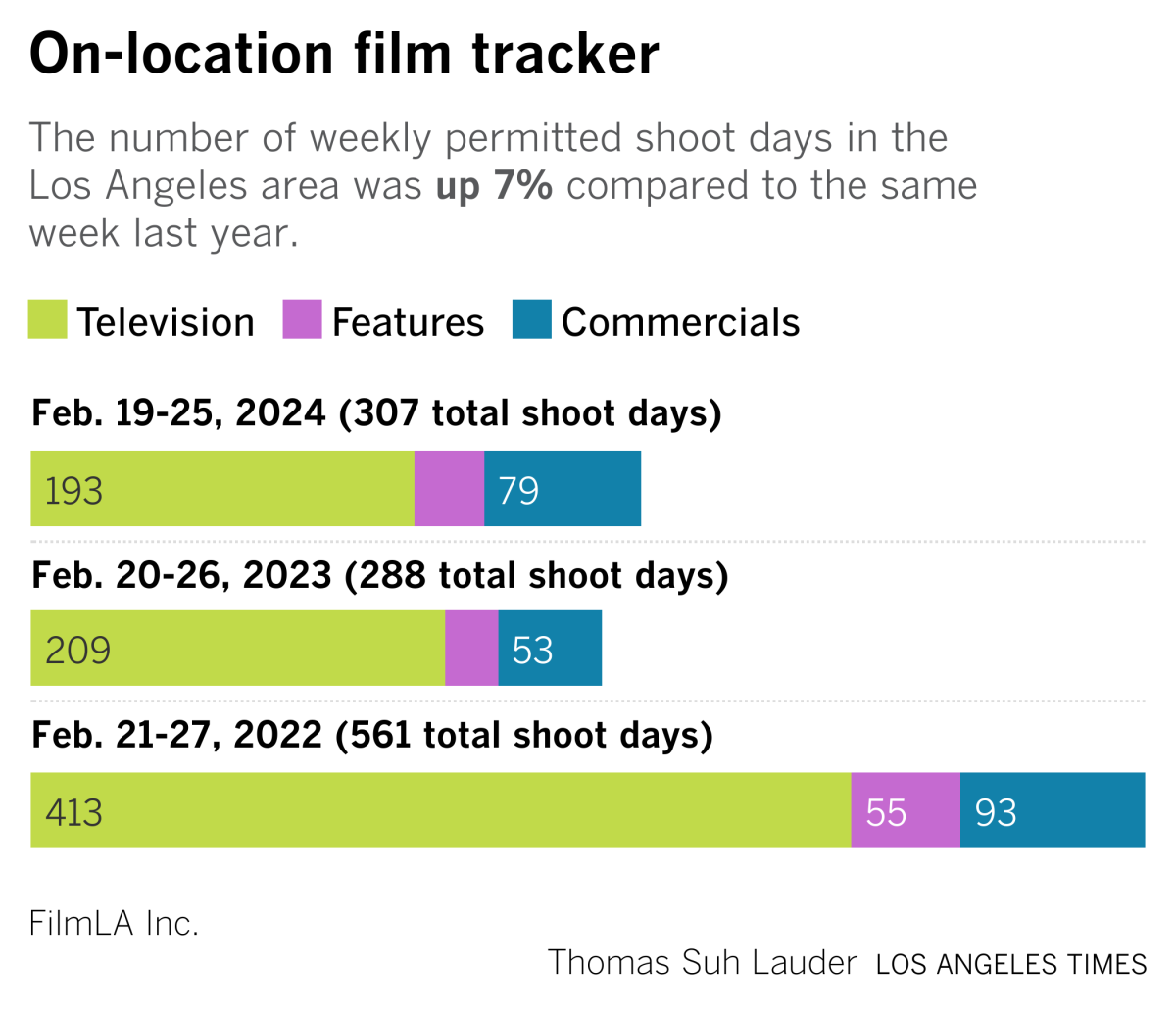After the launch of OpenAI’s Sora, can Hollywood adapt to the artificial intelligence ‘matrix’?

- Share via
The threat of artificial intelligence to Hollywood’s status quo entered a new phase of reality earlier this month when OpenAI, the company behind ChatGPT, introduced Sora, a tool that takes text-based prompts and uses them to generate photorealistic, and even cinematic, video.
As folks can observe from demos the company has posted online (Sora is not yet available to the general public but is still in testing), the program has used AI to create eerily crisp, professional-looking footage, all apparently based on simple written cues. A “stylish woman” walking down the streets of Tokyo in a black leather jacket. A movie trailer featuring a “30 year old space man.” An animation of a cute fluffy creature that could easily be in a Disney+ show or Illumination Entertainment film.
AI-generated imagery and video have been around for a while now. Last year, a relatively crude trailer for a fake “Star Wars” movie in the style of Wes Anderson went viral.
But the Sora news has inspired a fresh wave of freakout among creatives. Producers and executives have been angling for early access, eager to assess the potential applications for filmmaking.
Tyler Perry last week said he’d decided to put a planned $800-million expansion of his Atlanta studio on hold in part out of concern over the anticipated effects of text-to-video tech on movie and television production. “I am very, very concerned that in the near future, a lot of jobs are going to be lost,” he told the Hollywood Reporter.
AI has loomed large in the minds of creatives for much of the last year. The brisk rate of advancement, though exciting from a pure innovation perspective, is clearly a cause for anxiety among workers in the entertainment and media industries. While executives will say that they prefer working with humans rather than relying on machines, they are nonetheless under severe Wall Street pressure to cut costs, and automation offers tempting opportunities to do so.
On Monday, activist investor Blackwells Capital posted a presentation for shareholders that called on Walt Disney Co. to fully embrace AI in its studio and theme park businesses. “Disney will never be valued as a technology company, so long as it does not think like a technology company,” said Jason Aintabi, Blackwells’ chief investment officer, in a video.
An estimated 62,000 entertainment jobs in California spanning film, TV, music and gaming will be disrupted by the rise of artificial intelligence within the next three years, according to a study my colleague Christi Carras wrote about in January. Nationwide, some 204,000 entertainment roles could be affected, said the report commissioned by the Animation Guild, the Concept Art Assn., the Human Artistry Campaign and the National Cartoonists Society Foundation.
And it’s not just rank-and-file workers who should be nervous. People who own and operate visual effects and animation companies, for example, have every reason to stay vigilant, lest their services become obsolete or dramatically streamlined.
The Writers Guild of America and SAG-AFTRA won key protections for screenwriters and actors against being replaced by AI, following months of strikes that brought the industry to a halt. Those contract gains provided an important framework, but they only go so far. Some SAG-AFTRA members criticized the union’s deal with the Alliance of Motion Picture and Television Producers (AMPTP) for not going far enough to restrict the use of “synthetic performers,” or characters not based on the likeness of any particular actor.
For the record:
11:04 a.m. Feb. 27, 2024An earlier version of this story said the SAG Awards took place on Sunday. They were Saturday.
Fran Drescher, in a speech at Saturday’s Screen Actors Guild Awards that was livestreamed on Netflix, cheered her labor group’s new collective bargaining agreement while again warning against the specter of artificial intelligence in entertainment. “AI will entrap us in a matrix where none of us know what’s real,” the SAG-AFTRA president said. “If an inventor lacks empathy and spirituality, perhaps that’s not the invention we need.”
The inventions will keep coming, whether the unions like it or not.
That’s why more needs to happen to protect artists and craftspeople, and why those same workers need to educate themselves on how to adapt. Creators will continue to seek help from the courts to stop their intellectual property from getting ripped off by AI training models. Talent agency WME recently announced a partnership with AI startup Vermillio to protect clients against the unauthorized use of their IP and to monetize their images and likenesses in new ways.
The videos produced by Sora so far, as impressive as they appear to be, do not yet match what human creatives produce. The company only claims to create videos up to one minute in length. But this is early days. And as is often the case, the legal and labor framework will lag the rapid pace of technological change and the incentives in the market. That’s why it’s important for individuals and companies to be as proactive as they can in the face of what is likely to be an era of meaningful disruption.
You’re reading the Wide Shot
Ryan Faughnder delivers the latest news, analysis and insights on everything from streaming wars to production — and what it all means for the future.
You may occasionally receive promotional content from the Los Angeles Times.
Stuff we wrote
Sean Bailey, Disney’s live-action film boss, is leaving the company. Bailey had been viewed as a candidate for the top film job at Netflix, but a person familiar with the matter who was not authorized to comment said he’s not headed to the streaming giant. His recent films included the “Little Mermaid” remake and “Haunted Mansion,” a box office flop.
This activist investor is behind Disney’s boardroom drama, but he faces long odds. For the second time in a year, activist investor Nelson Peltz is battling Bob Iger and Disney to shake up the company and nab two board seats.
‘Sloppy’ or ‘a scapegoat’? Two portraits of ‘Rust’ armorer emerge at trial. The criminal trial for “Rust” weapons handler Hannah Gutierrez began last week. She faces a prison sentence of three years if convicted of involuntary manslaughter and evidence tampering. Prosecutors opened the first trial in the “Rust” shooting death by focusing on cinematographer Halyna Hutchins, who was killed by the gun fired by Alec Baldwin.
These entertainment workers could barely make rent. A Hollywood housing complex offers relief. The Hollywood Arts Collective, an affordable housing complex for entertainment workers in Los Angeles, opened in April near the start of the WGA strike.
The Tayoncé effect: Live Nation says concert attendance was up 20% in 2023. Live Nation reports that sales surged in the year of Beyoncé’s Renaissance tour and Taylor Swift’s Eras tour.
Disney’s ‘Mandalorian & Grogu’ to shoot in California thanks to huge tax credit. Upcoming “Star Wars” film “The Mandalorian & Grogu” will receive a $21.8 million tax credit to film in California, the California Film Commission announced.
The docket:
- L.A. ethics panel rejects proposed $11,250 fine for Leslie Moonves as too low
- Fubo calls proposed streaming service ‘sports cartel’
Number of the week

David Zaslav had a bad quarter. Warner Bros. Discovery’s stock took a hit after the company last week reported a wider loss than expected for the three months that ended in December. The firm reported a loss of $400 million, or 16 cents a share, which was worse than the 6-cents-a-share loss analysts had expected.
Blame the usual culprits: declining ratings for TV channels, softness in the advertising market, cord-cutting and the actors’ and writers’ strikes, plus a couple of box office underachievers in “Aquaman and the Lost Kingdom” and “The Color Purple.” Quarterly studio revenue was down 17% year-over-year.
But what really spooked investors was the lack of guidance for what kind of profit the company expects to take in this year, after posting $10.2 billion in adjusted earnings for 2023. Without a specific forecast from Warner Bros. Discovery management, analysts expect earnings will be down this year, in part because of the costs of resuming production after the strikes. The financial benefit studios gained from the “hot labor summer” was fleeting at best.
Also, Warner Bros. Discovery is expected to face stiff competition for its key NBA media rights package as tech giants including Amazon get in the mix, as my colleague Stephen Battaglio has been reporting. Warner Bros. Discovery is “fully engaged” in contract renewal discussions, Zaslav said.
Technically, the company’s direct-to-consumer segment turned a $103-million pretax annual profit, but that stat is misleading because it includes the flagship HBO pay-cable business, not just Max and Discovery+.
Zaslav & Co. continue to tout their free cash flow and progress toward paying down the postmerger debt load. The company has slashed costs and started licensing its content more aggressively to third parties including Netflix. But investors just aren’t buying it. The stock is down 65% since Discovery took over the former WarnerMedia assets from AT&T in 2022.
Film shoots
On-location filming production stats for the last week, according to FilmLA.

Best of the web
— Can Warner Bros. un-cancel J.K. Rowling? Hey, if Shane Gillis can come back to “SNL,” anything’s possible, right? (Wall Street Journal)
— A24, the “hipster” studio behind “Beef” and “Uncut Gems,” has private equity backing and mainstream ambitions. (Bloomberg)
Finally ...
Maren Morris has released a toned-down cover of the punk rock classic “Dancing With Myself.” I still prefer the Donnas’ version from the original “Mean Girls” soundtrack, but Morris’ is a lovely addition to the canon.
The Wide Shot is going to Sundance!
We’re sending daily dispatches from Park City throughout the festival’s first weekend. Sign up here for all things Sundance, plus a regular diet of news, analysis and insights on the business of Hollywood, from streaming wars to production.
You may occasionally receive promotional content from the Los Angeles Times.




